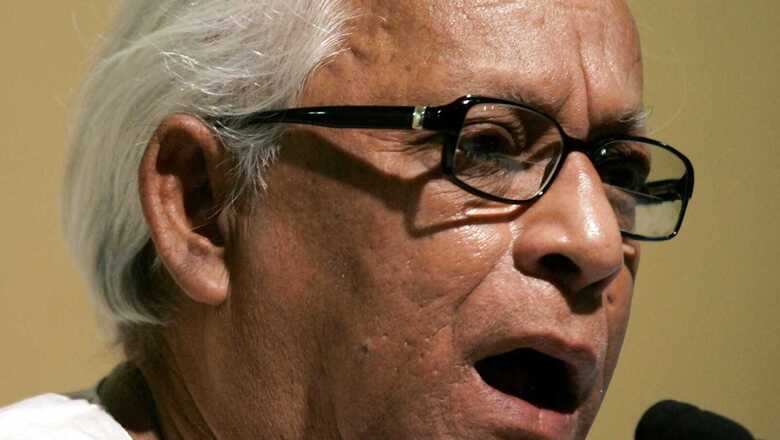
views
West Bengal produced many outstanding political brains. Some of them made it a habit to win elections. Former Chief Minister Buddhadeb Bhattacharjee of CPI(M) was surely not one of them. He will be remembered for daring to script a brief turnaround in the state’s declining industrial fortunes since the end of 1960s and paying a price for it.
Now in very poor health, Bhattacharjee was offered Padma Bhushan, the third-highest civilian award, by the Narendra Modi government in Delhi. It could have been an opportunity for objective assessment of Bhattacharjee’ government. It was a perfect opportunity for the CPI(M) to turn the spotlight on the failed agenda of industrial rejuvenation of West Bengal.
Instead, it ended up into a controversy with Bhattacharjee finding himself in the line of fire from both BJP and Trinamool.
In a written statement attributed to him, the former Chief Minister said: “I am not aware of the Padma Bhushan award being conferred on me. No one communicated it to me. If I was selected for the award, I decline it.”
Defending the Indefensible
He was defending the indefensible. According to the protocol, the prospective awardees are contacted before the finalisation of the list. In case of any objection (as was expressed by two eminent Bengali musicians this year), the respective names are dropped.
In a tweet on January 26 morning, Kanchan Gupta, senior adviser to the ministry of information and broadcasting, said, “Acceptance is sought and confirmation is secured before announcing Padma awards.” He blamed Bhattacharjee for not telling the truth.
A Times of India report was more categorical. It said a senior Union home ministry official called to take Bhattacharjee’s confirmation. As the 77-year Marxist leader was not in a due condition to speak, his wife took the call and conveyed the message to him.
The blame for this flip-flop should go to his party that jumped into the action after the list was published on January 25 evening. Though, officially, the CPI(M) left it on Bhattacharjee to take the call, the pressure was evident in a party tweet at around 10 pm on January 25.
“Com. Buddhadeb Bhattacharya who was nominated for the Padma Bhushan award has declined to accept it. The CPI(M) policy has been consistent in declining such awards from the State. Our work is for the people not for awards. Com EMS (former CM of Kerala) who was earlier offered an award had declined it,” the tweet reads.
CPI(M) referred to the same policy in rejecting a verbal proposal from Congress, in 2008, to give Bharat Ratna to the former West Bengal Chief Minister Jyoti Basu. However, the party did not stop Basu from receiving the ‘Mother Teresa Award’ from the All India Minority and Weaker Sections Council, in 2001.
It is beyond comprehension why a recognised political party with its share of stay in power be allergic to state recognition.
Either way, it’s now clear that the party threw Bhattacharjee under the bus. Evidently, the sick leader retracted his early confirmation to the Centre and claimed innocence. He could have been spared from this repeat ignominy.
Missed Opportunity
Bhattacharjee was elevated as Chief Minister (replacing Jyoti Basu) in 2000 to salvage the sagging image of a 24-year-old Left Front government that was facing widespread allegations of corruption, nepotism and lack of performance.
The grievances against the Left were oxygen to the newly formed Trinamool Congress of Mamata Banerjee, and the balance was tilting against the CPI(M).
Bhattacharjee swung into action from the word go. The police were empowered to take action against party musclemen. Measures were taken to address corruption and nepotism. The anti-industry face of the government was replaced by a pro-investment outlook.
The 2001 election was tough as the TMC and Congress formed a coalition. Left won the election with the promise to present a better government (“Unnototoro Bamfront”) under the leadership of Bhattacharjee. The 2006 election was a clean sweep.
Things went wrong hereafter. Bhattacharjee definitely had his share of mistakes like the police firing in Nandigram in 2007. Gaps in his political skill made a critical difference in crisis management. His emotional outbursts didn’t help the cause either.
However, at the same time, he had been a victim of circumstances.
The Maoists and Islamic fundamentalists, who were consolidating presence in the State since the 1990s, started flexing muscle. On top of all, his party had lost much of its popular tractions after three decades of stay in power, and was socially hated. Bhattacharjee had to bear the brunt.
People wanted change at any cost. They replaced Left (not Bhattacharjee) at the slightest available opportunity. The anti-land acquisition stir was just a plank. In the process, a great dream was sacrificed.
During the 1990s, the actual flow of investment in West Bengal was Rs 50-100 crore a year. It rose to Rs 200-250 crore in the early years of Bhattacharjee rule. Between 2004 and 2008, the actual flow was Rs 2,500-3,000 crore a year.
First private greenfield airport in India, eastern India’s first gas-based fertilizer plant, a huge boost to urban infrastructure, brownfield expansion of two integrated steel plants, investments in IT and ITeS, and last but not the least the prized investment in the automobile sector — were some of the high points of his tenure.
The momentum was short-lived but was so strong that most of the large projects, which became operational after his exit from power, were carried forward from that era. Many infrastructure projects were yet to be implemented.
Confused Politics
Bhattacharjee had failed because he dared to shift from the Jyoti Basu model of governance that was built on the principles of considered inaction and status quo. Basu sacrificed quick development prospects to protect the electoral composition. However, it also created a strong ecosystem to resist change.
Mamata Banerjee made full use of the ecosystem to win three consecutive elections. Her apparently silly resistance to the IT-SEZ proposal or denial to facilitate industry by land acquisition rests on Basu’s principle of status quo.
However, the policy has outlived its purpose in the days of disruptive technology, where jobs can vanish, industries can close down without any physical intervention.
The advent of electric vehicles, for example, may cause considerable displacement in the fuel bunkering business. The digital economy may create serious trouble for regular trade. Politicians like Prime Minister Narendra Modi are riding on this change.
Sadly, the Left is still undecided about its way forward. The supporters of old order politics have found a better alternative in Banerjee, who is more left than Left for all practical purposes. Ancient dogmas are coming in CPI(M)’s way in attracting those who want a change. Like the mythical Trishanku, they are neither here nor there.
The author is a researcher and political analyst. The views expressed in this article are those of the author and do not represent the stand of this publication.
Read all the Latest Opinions here














Comments
0 comment